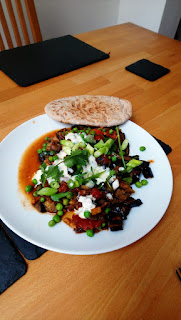Featured
- Get link
- X
- Other Apps
Focaccia
Hi, this recipe is from Lorraine Pascale's 'Baking made Easy' Cooking Book on page 28 and can be found online here. I decided that I wanted to bake a Focaccia loaf because this Saturday I made a delicious roast squash and almond traybake and served it with Focaccia (Recipe for traybake coming in 2 weeks, as the photograph I took didn't save, and I already have a plan for next week!). So, when I tried the Focaccia, I suddenly realised how much I enjoyed it and had forgotten about it from the last time I had had some. Then, me being me wanted to bake some myself, as my Dad had brought this one from Tesco, and see how it turned out. The result was amazing, I think the rosemary is definitely a necessity in it otherwise it would be plain flatbread. However, if that's your preference go for it. Additionally, I think that it could also be nice with some spices (cumin, garam masala, paprika etc) kneaded into the dough or topped with seeds as well, or even turned sweet by dolloping jam/marmalade/chocolate spread/chocolate chips/dried fruit into the indents instead of spices. Although, by doing this you do stray away from the traditional Focaccia, but I think that's okay as long as you call your bread a different name as Focaccia is defined as: 'A flatbread made with yeast, olive oil and herbs'. So, if adding spices or jams, then technically, it's more of a sweet flatbread, but it you're just changing the herbs or keeping this as a base recipe and adding cheese for example, I think it still counts. Enjoy!
Dietary Info:
-Contains Gluten (You could use a G-F plain flour, but be aware you may need to add extra liquid [olive oil and water] as G-F flour tends to absorb more liquid}
-No Nuts
-Dairy-Free
-Vegan
-Vegetarian
-Snack (delicious with butter when hot from the oven, or any spread/topping is amazing as well)
-Main Meal (only when used as a sandwich, served as a side to a salad, dunked in soup, in place or even as garlic bread to accompany a meal}
Ingredients:
-500g strong white bread flour, plus extra for dusting {I used plain flour}
-2tsp salt
-1 x 7g sachet of fast-action dried yeast
-80ml olive oil, plus extra for drizzling {I used extra virgin}
-150-250ml warm water
-vegetable oil or oil spray, for oiling {I just used extra olive oil}
-1 bunch of fresh rosemary {I sprinkled a pinch of dried rosemary into each indent}
-large pinch of sea salt
Method:
1:Dust a large flat baking tray with flour. {Mine was just over 40cm long} Put the flour in a large bowl, add the salt and yeast, then add the olive oil plus enough warm water to make a soft but not sticky dough. The dough should feel quite loose and not tight and difficult to knead. If the whole amount is added it may appear that the dough is beyond repair, but gently kneading by way of scooping up the dough, scraping any sticky bits on the surface and slapping it back down again for a few minutes will see the dough begin to become ‘pillowy’ and more manageable. The more water that can be added (the full 250ml is great) {I only managed 200ml, then it was getting a bit hard to deal with, so after I had brought it back to a 'pillowy' consistency, I didn't add any more.} then the lighter the bread will be. But it can take some perseverance. Also resist the temptation to add more flour as it will make the dough too heavy. {Although, you will need a floured worksurface}
2:Knead the dough for about ten minutes {I did about 15-20mins by hand as I was taking a while to incorporate all the water} by hand on a lightly floured work surface or for five minutes if using an electric mixer fitted with a dough hook. The dough will feel stretchy when pulled. To test if it is ready, make a ball with the dough then, using a well-floured finger, prod a shallow indent in the side (no more than ¾cm). If the indent disappears by way of the dough springing back then it is ready to shape. If the indent stays {mine stayed ever so slightly but as the majority sprung up, it was fine by me}, knead for a few minutes longer. Shape the dough into an oval and place it on the prepared baking tray. Flatten it out to about 30cm long and 20cm wide. Cover the dough loosely with oiled clingfilm, making sure it is airtight.
3:Preheat the oven to 200°C/180℃ fan/265℉/Gas mark 6. {I didn't bother preheating my oven until 5mins before the dough had finished proving} Leave the dough in a warm place for about 1 hour, or until it has almost doubled in size. With a floured index finger press holes in the dough at regular intervals, about 4cm apart in rows across the dough, pressing right down to the bottom. Take 3cm long sprigs of the rosemary and push them into the holes. {I sprinkled some rosemary into the holes instead} Sprinkle some sea salt over the dough and place in the top third of the oven. {I used coarse, flaky sea salt for on top of the bread as I felt it would work better than generic table salt} Bake for about 25–30 minutes, {Mine was done in 25mins} or until the bread is well risen, light golden brown and feels hollow when tapped underneath.
4:Remove from the oven, drizzle with the remaining olive oil and leave to cool on the baking tray.
While you're here, I have a Pinterest for all my recipes where you can save them to boards for the future and categorise them into different types of recipe e.g Sunday Dinners, picnic ideas etc. My account is @hazellikestocook, or find the link below. Also, I have a whole blog post explaining this in more detail here and https://hazelscookingandbakingblog.blogspot.com/2021/02/pinterest.html.
https://pin.it/5xDvARk - my profile
This recipe: https://pin.it/63dmBR4
- Get link
- X
- Other Apps



Comments
Post a Comment